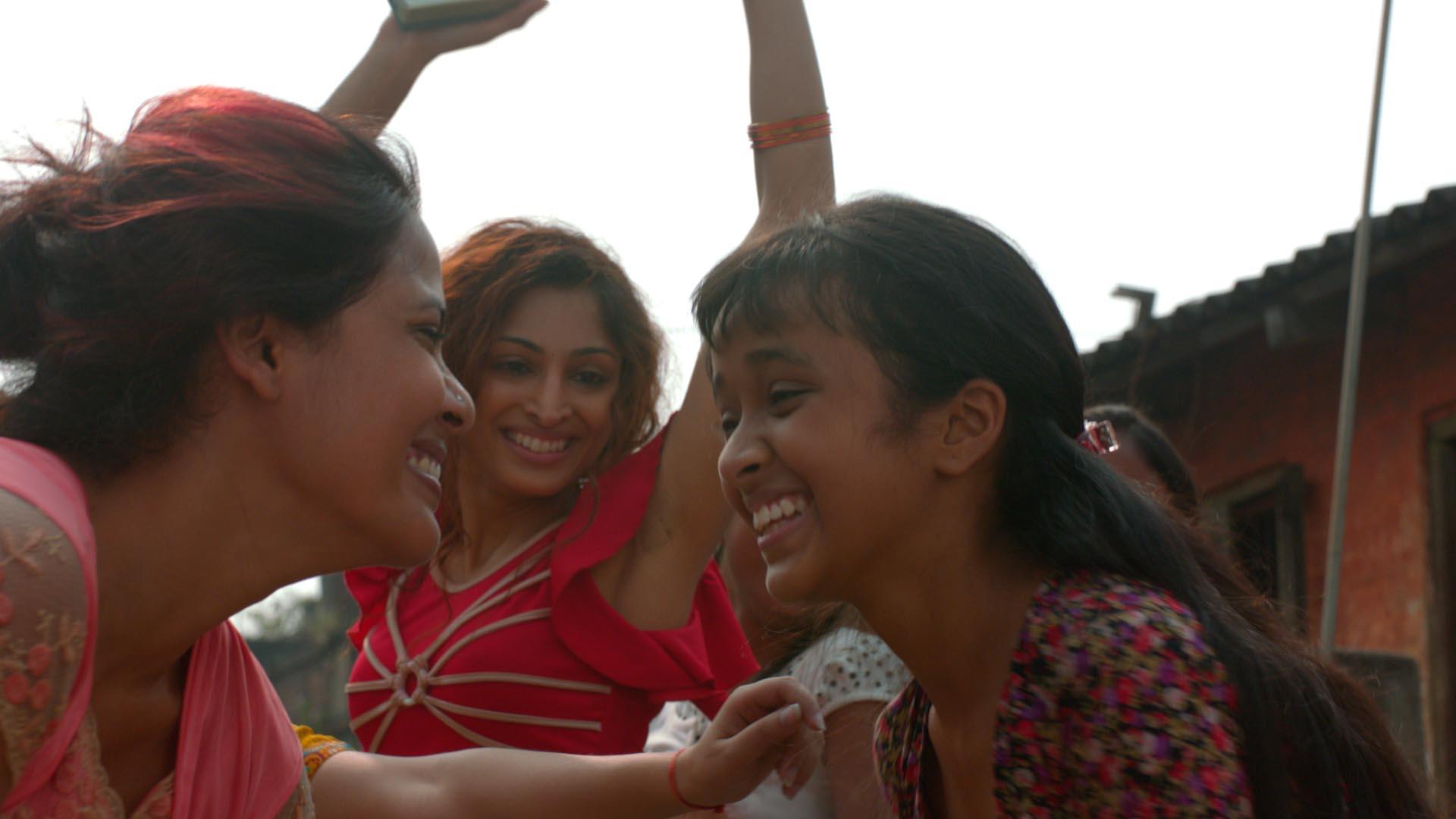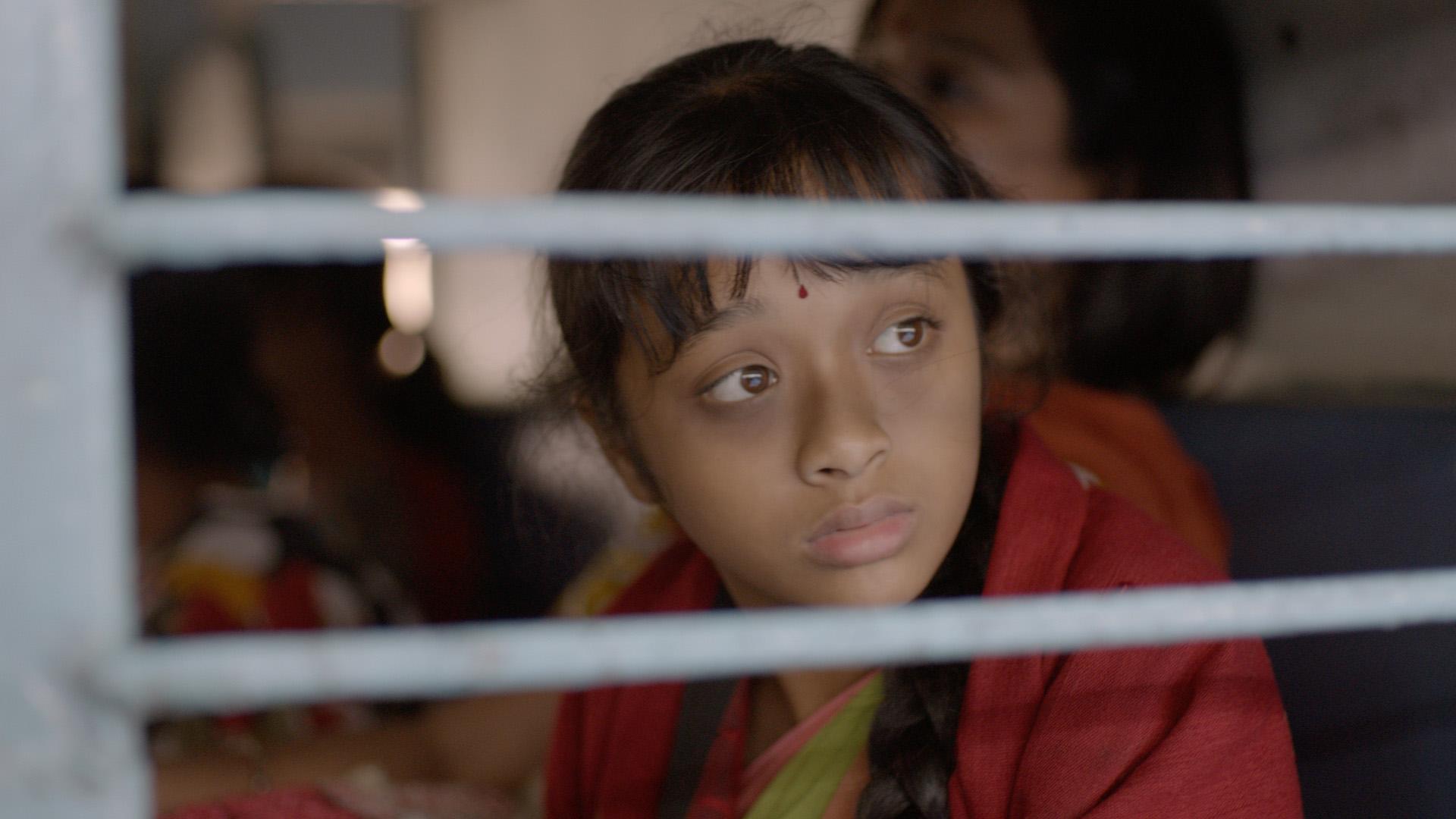New film about sex trafficking celebrates the resilience of children
Still from "Sold"
A few years ago, two young girls were on a bus to Kathmandu, having heard about a job there. They heard a story on the radio about a young girl named Lakshmi who’d been lured from Nepal to India thinking she’d get a job, only to be trafficked into a brothel called the Happiness House.
Lakshmi was not a real girl, but a character from a novel called "Sold," which was being read on the radio as part of a trafficking prevention program by the Didi project, a nonprofit dedicated to providing educational opportunities for women and children in Nepal.
Lakshmi’s story had an impact: The girls on the bus recognized they were in the same situation.
“Because they heard the story on the radio, they realized they were being trafficked,” says Jane Charles, co-founder of the nonprofit Stolen Youth, which raises funds to support the rescue and recovery of sexually exploited youth. “They had the bus driver stop and got off and went home.”
Charles is the producer of the film, "Sold," being released in the United States on April 1, based on the young adult novel by Patricia McCormick. The film follows the story of Lakshmi, a 13-year-old Nepali girl who is lured from her rural village by a woman who says she has a job for the girl in Kolkata. The woman turns out to be a pimp.
Throughout Lakshmi’s journey, adults promise she’ll be able to send money back to her family and provide them with the tin roof she dreams of. Instead, she’s beaten until her feet bleed. She eats and sleeps on a concrete floor. And the audience witnesses her first pimp-facilitated rape up close.
Despite constant abuse, Lakshmi is a relatable teenager with complex emotions. She is naive enough to fall in love with a cunning customer, but clever enough to hide her earnings inside a secret pocket in her blanket. She is angry about the bullying from other girls in the brothel, but she also forms friendships with them. In Lakshmi’s experience, human resiliency rides alongside betrayal, trickery, and violence. And while the story is heart-wrenching, it shows the power of young people to stand up for themselves.
“Heroes lift us up. They give us courage. They nourish us as humans,” says "Sold’s" director, Oscar-winner Jeffrey Brown. “For me, this is definitely a film about human trafficking. But it’s also a film about transcending your fear and not being a prisoner to your fear.”
When McCormick wrote the novel on which the film is based, she chose to write for young adults because she believes kids care about understanding what is happening to their peers, like Lakshmi, around the world.
“They have a reputation for being self-centered, which I really disagree with,” she says, citing young people’s “enormous” capacity for empathy and activism.
McCormick says young readers have tremendous discernment and don’t want to be protected from life’s realities.
“I think you gain power over the sadness of a story like this by being able to do something about it,” says McCormick.
oembed://https%3A//vimeo.com/100906572
When the young actress Niyar Saika first read "Sold," she had never heard of human trafficking. Saika, who plays Lakshmi in the movie, came across the book before she had even thought about auditioning for the movie.
“I didn’t even know a thing like [sex trafficking] existed,” she says. “And believe me, it scared me so much. It was horrifying.”
Saika, now 16, comes from an area of rural India where many girls her age become targets of traffickers. She describes her role as “the most difficult thing I’ve ever done.” Our conversation, over e-mail, is peppered with words like, “difficult,” “confusing,” and “horrifying.”
“I had never been drawn into a book the way "Sold" drew me in,” she says. Especially hard was doing justice to Lakshmi’s experiences.
“There were scenes when they pretended to slap me or beat my feet in the film and I didn’t know how to cry out in that agony and pain,” she says.
Some nights, after especially grueling shoots, she’d come back to her hotel room and take a two-hour bath to soak the experience away.
“I couldn’t even believe that girls were being used to this extent,” she says.
The International Labor Organization estimates that, worldwide, of the approximately 21 million people trafficked into forced labor—including sexual labor, which accounts for more than 20 percent of cases—more than a quarter of the victims are children.
By and large, trafficked youth face coercion and abuse similar to what Lakshmi experiences. Natural disasters, like the earthquake in Nepal that killed more than 8,000 people in 2015 and destroyed hundreds of thousands of homes, leave young people more vulnerable than ever. Child Reach International, one of the film’s partner organizations, estimates that 20,000 children are trafficked out of Nepal each year—often to India. The organization is also rebuilding schools in Nepal after the earthquake, which destroyed more than 5,000 schools.
Ruchira Gupta is the founder of Apne Aap, an Indian organization dedicated to ending sex trafficking through legal support, prosecution of traffickers, rights-based education, and vocational training.
Gupta has been working with trafficking survivors in Kolkata, Delhi, Mumbai, and the state of Bihar for 15 years. Gupta says that, unlike with Lakshmi, who (spoiler alert) runs away from the brothel with the help of an American posing as a customer (David Arquette), most outreach is done by Indian social workers.
“I have American celebrities on my board, like Gloria Steinem and Ashley Judd,” says Gupta, “but the people who go into the brothels here and rescue the girls are Indian.” When Apne Aap helps remove girls like Lakshmi from exploitation, they often must escort them through neighborhoods surveilled by organized crime.
Saika hopes Lakshmi’s story will also make an impact among students in countries like the United States, where the film is being adapted for schools.
“It definitely changed the way I see the world,” she says. “The fact that she never broke down, and struggled all the time, inspired me a lot.”

Charles says that, in addition to developing a short version of the film for school-age audiences, the filmmakers and partner organizations are developing curricula that encourage students to speak out against sexual exploitation. They are modeling this work on a curriculum developed by the Chicago Alliance Against Sexual Exploitation (CAASE), which is designed to educate young men about the potential harm of prostitution and enlist them as allies in opposing violence against women and girls. The program has reached more than 2,300 students since the curriculum launched in 2010.
The subject matter is undoubtedly difficult—Saika herself initially did not want to take on the “scary and difficult” role, she says. Eventually, though, she decided to take it on as a “challenge, and do it for all the girls who go through this.”
“Any kind of difficult experience we have can either shut you down or it can open you up and make you stronger and make you more empathetic and more compassionate,” Brown, the director, says. “[It can make you] more committed to love, which lifts us all up and connects us. That’s at the core of the film.”
This story was originally published by YES! Magazine, a nonprofit publication that supports people’s active engagement in solving today’s social, political and environmental challenges.
